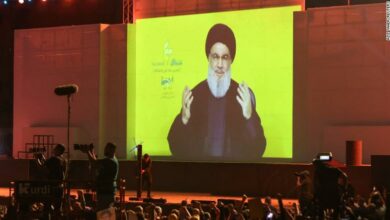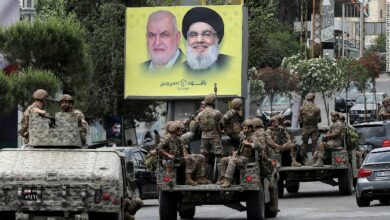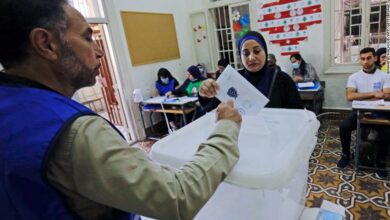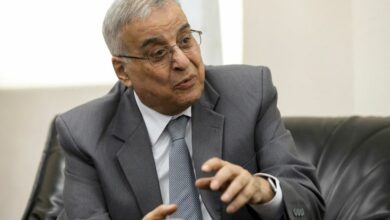Hezbollah chief Hassan Nasrallah said Friday he is ready to fight radical Muslims in Syria, a day after a deadly bombing in a Beirut stronghold of his Shiite pro-Damascus group.
Nasrallah also accused Sunni extremists of responsibility for the car bombing that killed at least 22 people, in remarks after a previously unknown group, apparently a Syrian rebel cell, said it carried out Thursday's attack.
"I will go myself to Syria if it is so necessary in the battle against the takfiris [radical Sunni Muslims], Hezbollah and I will go to Syria" to fight rebels trying to oust the Damascus regime, he said defiantly.
In a speech broadcast on television as Lebanon held a day of mourning for the victims of the bombing, Nasrallah said "all indications concerning yesterday's attack lead to the takfiri groups."
Police said at least 22 people were killed in the bombing that targeted the densely populated southern suburbs of Beirut, between the Hezbollah bastions of Bir el-Abed and Rweiss. The Red Cross said 325 were wounded.
Hezbollah is a key supporter of President Bashar al-Assad and has sent fighters across the border to Syria this year to bolster government forces, which have been battling a deadly anti-regime revolt since March 2011.
An online video surfaced shortly after the attack showing three masked men, two of them holding rifles, in front of a white flag inscribed with the Islamic profession of faith.
"You, the pig Hassan Nasrallah, we send you our second powerful message because you haven't understood yet," said one member of the group calling itself the Battalion of Aisha, an apparent Sunni affiliation.
Thursday's blast comes six weeks after a car bomb attack in the same area wounded more than 50 people.
Nasrallah said the attacks will not weaken his resolve to support the Assad regime who has been locked in a deadly war with rebels trying to topple him since March 2011.
"If you think that by killing our women, our children and innocent people, by destroying our neighbourhoods, we will withdraw [support of Assad], you are fooling yourselves," Nasrallah told his detractors.
"Our response to every such attack is that where we have 100 fighters in Syria, we will be sending 200 and if there are 5,000 we will send 10,000."
But in a bid to ease growing tensions between Sunni and Shiite Lebanese divided over the war in Syria, the Hezbollah chief said Thursday's bombers "are not Sunnis, they are assassins."
And he accused them of seeking to drag Lebanon into "civil war."
Lebanon is deeply divided into supporters and opponents of the regime in neighbouring Syria.
Sectarian tensions in Lebanon have soared as the Syrian conflict has raged on, with deadly clashes mostly in the northern city of Tripoli between Sunni supporters of the rebels and Alawite backers of Assad, who hails from the minority Shiite offshoot sect.
Defence Minister Fayez Ghosn said authorities had identified a seven-member cell of Lebanese suspected of preparing car bombs to be blown up in Hezbollah strongholds.
Thursday's bombing was condemned from across Lebanon's fractious political spectrum, and by the international community.
President Michel Sleiman said the "terrorist" bombing targeted all Lebanese citizens, and not just Hezbollah supporters.
Former Prime Minister Saad Hariri, a Sunni leader and staunch critic of Hezbollah, said the attack was "part of a vicious terrorist scheme" targeting Lebanon.
UN chief Ban Ki-moon called for unity while the Security Council urged all parties to refrain from any involvement in the Syria conflict.
On Friday investigators combed the scene for clues, as Hezbollah members in civilian clothes stopped and searched cars in the southern suburbs of Beirut, an AFP photographer reported.
The blast, reminiscent of the frequent attacks during Lebanon's 1975-1990 civil war, caused heavy damage to buildings and set several cars ablaze.
A witness told a Lebanese television channel he saw a van drive past three times before its driver found a parking spot where he set off the bomb.
The explosion had the impact of an "earthquake," another witness said.
"Hezbollah made a strategic mistake (by sending fighters to Syria) and these are the results," said Ghassan al-Azzi, a professor of political sciences at the Lebanese University.




